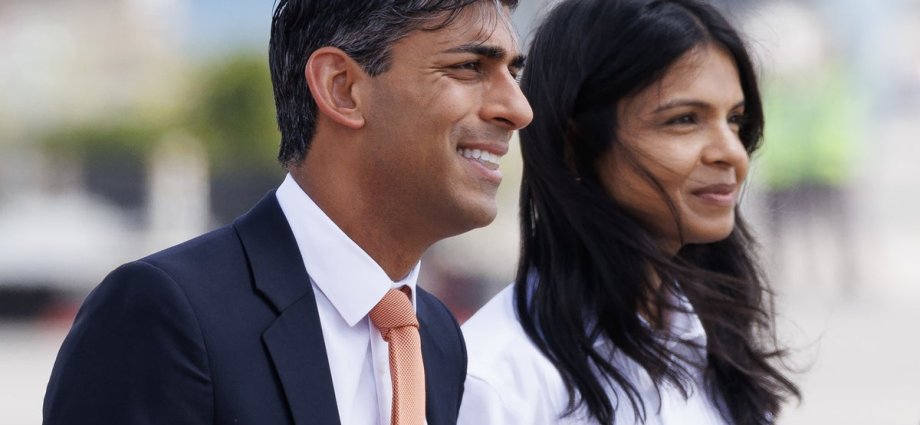The couple spent some of the morning at the 100-acre Akshardham temple in New Delhi.
Mr Sunak and Mrs Murty, both practising Hindus, joined in with Sanskrit singing as they made prayer offerings to a golden statue of Lord Swaminarayan.
Afterwards, the couple headed to join other G20 leaders at the Raj Ghat memorial in the city, with one of the memorials dedicated to the Indian independence leader Mahatma Gandhi.
Mr Sunak will later take part in the final session of the summit, called One Future, where the focus will be on transformative technologies, before flying back to the UK.
Ahead of the session, the British leader announced a record UK contribution to an international climate change fund in answer to Indian Prime Minister Narendra Modi’s call for more financing to support developing nations.
Downing Street announced that Britain will provide two billion US dollars (£1.6 billion) to the Green Climate Fund (GCF) for 2024-27.
No 10 officials said it marked the biggest single funding commitment the UK has made to help the world tackle climate change.
It comes after Mr Modi, who as leader of India is president of the G20 this year, made a call ahead of the summit for wealthier countries to offer support for developing nations that are battling against the impact of climate change, which is being experienced in the form of harsher weather conditions and rising sea levels.
In an article published in a host of international publications, including The Times, Mr Modi said: “Ambitions for climate action must be matched with actions on climate finance and transfer of technology.”
The bumper climate change contribution comes in the context of the UK and India negotiating a potential free trade deal, with Mr Sunak and his Indian counterpart broaching the topic during talks on the fringes of the summit on Saturday.
Speaking after their conversation, Mr Sunak signalled that there was optimism the two countries could “work through” the final negotiation hurdles.
A readout from India’s ministry of external affairs said both leaders “expressed hope” during their meeting that the remaining issues in the trade talks could be “addressed at the earliest” to pave the way for a “balanced, mutually beneficial and forward looking” accord to be concluded.
Mr Sunak also accepted an invitation from Mr Modi to make a return visit to India at an “early, mutually convenient date for a more detailed discussion”, according to the ministry’s statement.
In an unexpected move at the summit, India managed to secure a joint agreement on Saturday, with all 20 of the world’s top economies signing off on wording in relation to the situation in Ukraine.
Mr Sunak said he thought a “very strong” joint message about Moscow’s attack had been made “under Prime Minister Modi and India’s presidency” of the G20, particularly on the impact of the Kremlin’s blockade of Ukrainian grain.
But Ukraine hit out at the communique after Russia and China objected even to language that they had agreed to last year at the G20 summit in Bali when Moscow’s “aggression” was cited.
The final statement this year, released a day before the formal close of the summit, highlighted the “human suffering and negative added impacts of the war in Ukraine”, but did not mention Russian President Vladimir Putin’s invasion.
Oleg Nikolenko, a spokesman for the Ukrainian foreign ministry, tweeted: “We are grateful to the partners who tried to include strong wording in the text. In terms of Russia’s aggression against Ukraine, G20 has nothing to be proud of.”
Mr Putin stayed away from the Indian summit, with the Prime Minister saying his absence showed how the authoritarian leader was “completely isolated” on the world stage.
Elsewhere at the summit, the G20 announced a plan to develop a rail and shipping corridor connecting India, the Middle East, and the European Union.
Mr Modi, European Commission president Ursula von der Leyen and Mr Biden were among those participating in unveiling the mammoth plan, with the US president reportedly calling it a “real big deal”.
No timeline has been announced for when the corridor’s construction will be completed.











